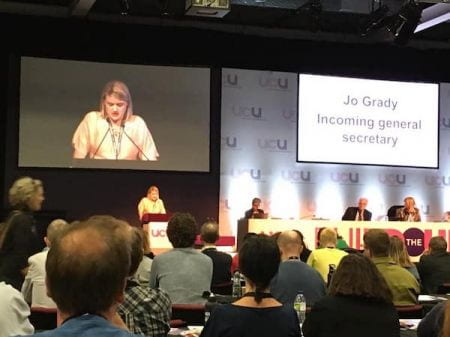June 2019
A new General Secretary and a new dynamism at UCU Congress
The text of all the motions and their outcomes can be found at https://www.ucu.org.uk/Congress2019
UCU’s annual Congress took place last weekend with the news that Jo Grady has been elected as the union’s new General Secretary.
This is good news for all those who want to extend democracy and strengthen the control of ordinary members over the direction of the union. Participation in the election was up by 50% on the last General Secretary election, the result primarily of the increased involvement of members in pre-92 universities since the USS dispute last year. Jo Grady is herself from that constituency and spoke directly for the members who electrified the union by taking four weeks of almost continuous strike action in defence of pensions and against the marketisation of higher eduction.
In her address to Congress, Jo Grady spoke about the need for union structures to reflect the needs and views of UCU’s diverse membership and signalled her support for an active, fighting union. She also repeated her promise to accept changes to her contract if the union adopts a recall mechanism for the General Secretary.
That Jo Grady’s election represents a significant shift in the UCU is reinforced by the defeat of Matt Waddup, the candidate of the appointed professional employees of the union. This group, along with the previous General Secretary, preferred to shut down both the USS dispute and Congress last year rather than submit to the will of members. Jo Grady’s election therefore represents the revenge of the rank and file following those events.
The final part of that revenge was the decision by pre-92 Congress delegates to relaunch the USS dispute. USS directors have rejected the findings of the joint expert panel set up after last year’s strikes which endorsed the UCU’s assessment that there was no deficit in the fund and no need for major changes to it. They are continuing with their plans to drastically increase contributions while slashing payouts. Pre-92 branches took the decision to ballot for renewed strike action in the autumn, something that would not have been necessary if the campaign had not been prematurely called off by the previous General Secretary.

Photo by Grant Buttars, 2019. Used with permission.
Source: https://www.rs21.org.uk/2019/06/04/big-changes-at-ucu-congress-2019/.
HE pay
Congress delegates also voted to reject university employers’ ‘final’ offer of 1.8% on pay for 2019-20 and to initiate the preparations for a campaign of industrial action in the autumn. The crucial motion was from Brighton UCU which argued that despite most branches failing to meet the government-imposed turnout threshold last year, we have no choice but to try again this year. Failure to do so would signal to the employers that they can continue to impose real term pay cuts, ignore the gender pay gap and maintain high levels of casualisation with impunity. Last year’s ballots showed huge majorities in favour of action over pay, and UCU branches are increasingly following the example of Brighton UCU in finding ways to beat the 50% threshold in local ballots.
Organising a disaggregated ballot will mean that post-92 branches that exceed the turnout can take industrial action alongside pre-92 branches fighting over the pensions, and creates the prospect of a joint battle over pay and pensions this autumn.
There was a palpable sense of optimism that the union has turned a corner in its ability to win disputes. Winchester University is one of a number of HE branches which has fought off compulsory redundancies by winning a ballot and threatening strike action, while rolling strikes in FE colleges are wining real-terms pay rises for the first time in a generation.
FE branches are also showing the way on casualisation, several of them having won agreements, as a result of strike action, to shift temporary staff onto permanent contracts. Numerous motions committed the union to redoubling its efforts to end the scourge of casualisation in HE too.
The threat to our pensions
For the same reason that the employers want to trash USS pensions in the pre-92 universities, the Teachers’ Pension Scheme is under attack in the post-92 institutions. A single public sector pension scheme with defined benefits undermines the competition between institutions that the government is fostering. Marketisation encourages de-mutualisation.
Congress noted the tendency for post-92 university managements to try to push staff off TPS, a tendency which has been accelerated by the recent sharp increase in employers’ contributions. Congress sounded the warning that, like our pre-92 colleagues, we are likely to have to fight to defend our pension scheme.
Union democracy
Debates on issues of internal democracy continue to reveal the battle lines within the union. A rule-change motion from Southampton UCU provoked a protest in the hall from delegates outraged at its attempt to marginalise the voices of FE members and entrench the voting weight of pre-92 universities at Congress, and was comprehensively defeated. Unfortunately, a proposal to put control of national disputes in the hands of strike committees composed of branch delegates narrowly failed to win the required two-thirds majority.
Political issues
The UCU has an excellent record of taking a political stand on a range of issues and urging its members to become involved. This year, three issues dominated: climate change, anti-racism, and the visit of Donald Trump.
There were many motions in solidarity with the recent school student strikes and protests by Extinction Rebellion demanding action to tackle the climate emergency. This is now such a pressing issue that trade unions must take it up vigorously. UCU is pushing for all colleges and universities to declare a climate emergency and to commit to being zero carbon by 2030. The call by Greta Thunberg for a general strike against climate change in September was welcomed and UCU members were urged to find ways to support it.
Congress endorsed the work the union has been doing with Stand Up to Racism in challenging the growth of the far right. News of Tommy Robinson’s humiliation in the European elections came through during Congress but the threat from the racist right remains.
Motions from Brighton
Several motions from Brighton University branches were on the agenda of Congress. A motion from Grand Parade was crucial in committing the union to a fight over pay this year. Falmer’s motion on strategies for overcoming the anti-union laws passed overwhelmingly.
Another motion from Falmer calling for an audit on the union’s progress in addressing sexual harassment in universities also passed without opposition, as did an amendment calling for more help for branches to arm themselves for pay and jobs campaigns by analysing the financial accounts of colleges and universities.
Two Brighton motions were not debated due to a lack of time. One was on the Augar Review, which reported yesterday and is recommending a cut in the student fee without any guarantee to university funding; and one on defending Jeremy Corbyn from charges of antisemitism based on the false position that supporting the Palestinian cause and opposing Israel is itself antisemitic.



Leave a Reply